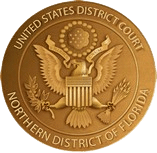Restraining Order Laws in Florida
A restraining order, also known as an injunction, protective injunction, or protective order, is a legal order by the court to prevent the respondent (defendant) from contacting the petitioner in any way. That means the respondent is not allowed to go to the petitioner’s home, work, or any other place within the parameters of the injunction. The respondent is also prohibited from contacting the alleged victim by phone, email, or in person. Many restraining orders also require the respondent to surrender firearms and ammunition.
Why Do People Seek Injunctions?
While the purpose of a restraining order is to protect the petitioner, many people who seek an injunction have other reasons. They may want to obtain leverage in a custody battle or divorce case, exact revenge, or hurt the respondent for some reason. They are prevalent in pending family law matters.
Types of Florida Restraining Orders
A Florida judge might use multiple injunctions, depending on the specific type of harm involved or the relationship between the petitioner and the respondent. Courts may issue the following types of injunctions:
- Prevention of Domestic Violence (§ 741.30, Fla. Stat.)
- Prevention of Stalking (§ 784.0485, Fla. Stat.)
- Prevention of Dating Violence (§ 784.046, Fla. Stat.)
- Prevention of Sexual Violence (§ 784.046, Fla. Stat.)
- Prevention of Repeat Violence (§ 784.046, Fla. Stat.)
Each injunction allows the court to prevent the respondent’s movement and potentially remove their gun rights.
How to Get a Restraining Order in Florida
To obtain a restraining order, the petitioner and their attorney must simply file a petition with the court. They must present evidence that the respondent has harmed the petitioner or has made a reasonable threat.
It should be noted that a person may obtain a temporary injunction with very little evidence and without notice to the respondent. The temporary restraining order is only effective for a short period (up to 15 days maximum) before the actual hearing for the longer-term restraining order is put into place.
Before a restraining order is issued, the court will hold a hearing where both sides present evidence. You might think that you will receive a fair trial, and the judge will be able to see through the lies. However, that is not always the case. Many injunctions are issued based on false allegations.
Once the hearing is completed, the judge will decide whether a permanent protective order should be put into place. If the judge denies the permanent protective order, the temporary injunction is automatically dissolved. If the order is entered, the respondent must comply with all terms of the injunction.
What Happens If You Violate a Restraining Order in Florida?
You will face criminal penalties if you violate a restraining order in Florida. Violating a restraining order is a first-degree misdemeanor, punishable by up to one year in jail and a fine of up to $1,500. A third or subsequent restraining order violation is a third-degree felony, punishable by up to five years in prison and a fine of up to $5,000.
Collateral Consequences
In addition to criminal penalties, violating a restraining order can also have other consequences, such as:
- You may be ordered to pay restitution to the victim.
- You may lose your gun rights.
- You may have difficulty finding housing or employment.
- You may have your child custody or visitation rights restricted.
How Can a Restraining Order Lawyer Help Your Case
A restraining order will severely limit where you can go and other constitutional rights. You should work closely with an injunction lawyer who can help you challenge every aspect of the allegations against you.
Representing You in Court
A lawyer can represent you in court during the restraining order hearing. They can argue on your behalf and present evidence to support your case. The other party will likely have their own legal team. You shouldn’t go up against them alone.
Negotiating With the Other Party
A lawyer may be able to negotiate with the other party to reach an agreement on the terms of the restraining order. This can save you time and money and can help to avoid a contentious court hearing.
Modifying or Terminating a Restraining Order
Restraining orders and their terms do not have to be permanent. If you need to modify or terminate a restraining order, a lawyer can help you with this process.
Avoid Criminal Penalties and Keep Your Rights – Call Today
A restraining order will significantly limit your constitutional rights. If you violate a restraining order, you may face time behind bars and other consequences. You don’t have to deal with this alone. With a skilled injunction lawyer at Mitkevicius Law, PLLC, you can work towards a fair resolution.
Lawyer Josef Mitkevicius has more than 10 years of legal experience that he will bring to bear for you. Contact us at 850-361-2142 to schedule your free consultation with a domestic violence lawyer.





